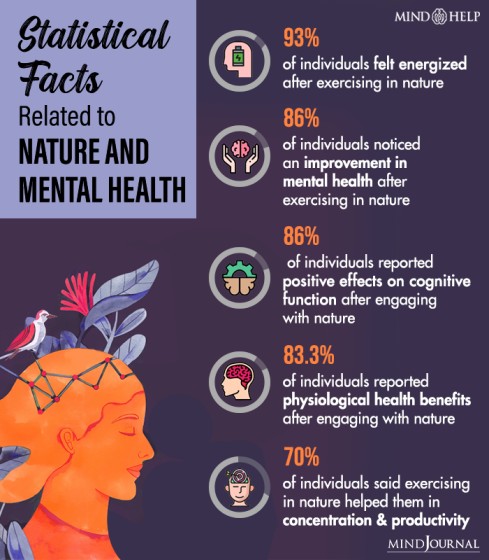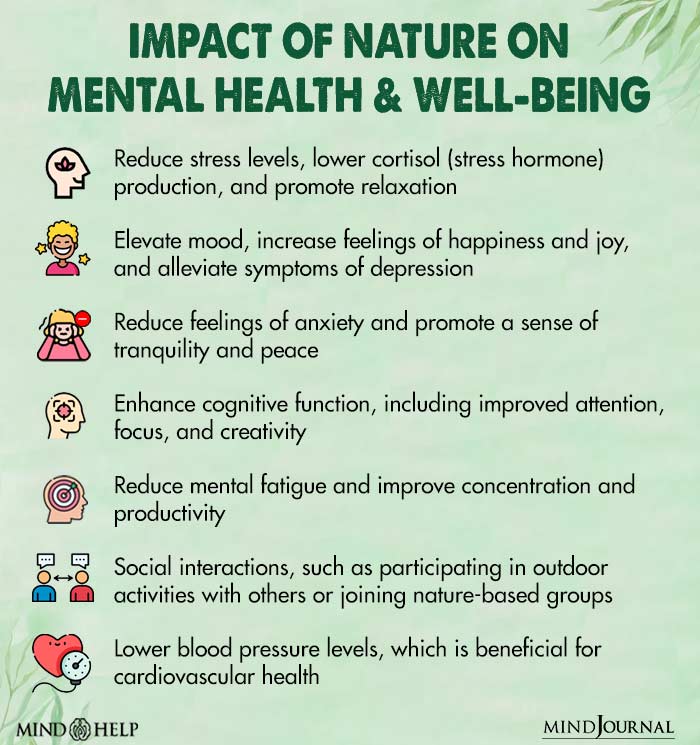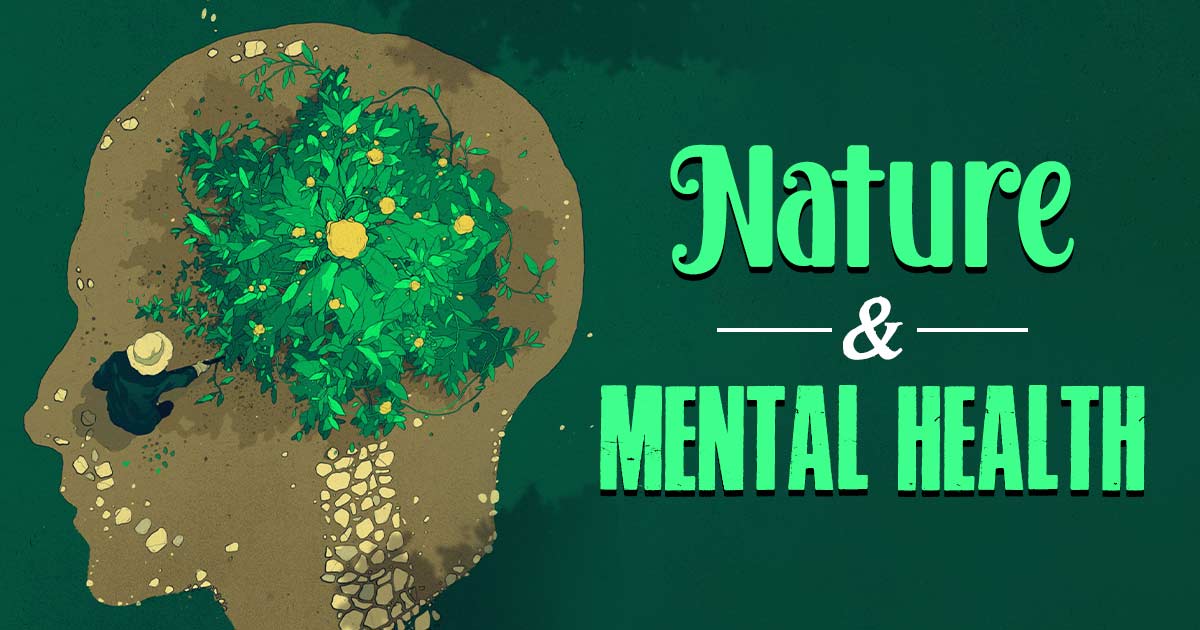Nature and mental health are intricately linked, as the positive impact of natural environments on mental well-being is widely acknowledged. Immersing oneself in the beauty and tranquility of nature can bring about significant benefits, including reduced stress, improved mood, restored energy, enhanced mindfulness, and an overall sense of well-being.
The Link Between Nature and Mental Health
Nature encompasses the physical world, including landscapes, plants, animals, and natural phenomena, while mental health refers to 1 Hartig, T., Mitchell, R., de Vries, S., & Frumkin, H. (2014). Nature and health. Annual review of public health, 35, 207–228. https://doi.org/10.1146/annurev-publhealth-032013-182443 a person’s emotional, psychological, and social well-being. The connection between nature and mental health revolves around how the natural environment influences an individual’s psychological state.
Engaging with nature through activities like spending time 2 Coventry, P. A., Brown, J. E., Pervin, J., Brabyn, S., Pateman, R., Breedvelt, J., Gilbody, S., Stancliffe, R., McEachan, R., & White, P. L. (2021). Nature-based outdoor activities for mental and physical health: Systematic review and meta-analysis. SSM – population health, 16, 100934. https://doi.org/10.1016/j.ssmph.2021.100934 outdoors or immersing oneself in natural settings has been found to promote relaxation, enhance cognitive function, and improve overall mental well-being. Nature-based interventions and ecotherapy are examples of approaches that harness the therapeutic mental health benefits of nature to enhance psychological resilience.

Factors that Impact Nature and Mental Health
Environmental factors can 3 Jimenez, M. P., DeVille, N. V., Elliott, E. G., Schiff, J. E., Wilt, G. E., Hart, J. E., & James, P. (2021). Associations between Nature Exposure and Health: A Review of the Evidence. International journal of environmental research and public health, 18(9), 4790. https://doi.org/10.3390/ijerph18094790 significantly influence mental health, and they can be categorized into three main types:
1. Physical Factors
These include pollution levels, working conditions, and weather conditions, which can impact mental well-being and contribute to stress or discomfort.
2. Social Factors
Abuse, poor social support systems, and toxic relationships can have detrimental effects on mental health, leading to increased stress, anxiety, and depression.
3. Other Factors
Lack of stimulation, limited access to green outdoor spaces, and living in messy or cluttered environments can negatively impact mental health and contribute to feelings of overwhelm or disorganization.

How Does Nature Affect Mental Health
Being nurtured by nature and connecting with its beauty and serenity can have profound effects, such as nurturing one’s spiritual well-being, enhancing emotional stability, and providing a deeper understanding of life’s challenges.
Additionally, access to green spaces promotes physical activity, improves the outlook on life, and benefits both the physical and mental health of individuals across different age groups.
Nature has a significant impact on 4 Stoewen D. L. (2022). Nature, nurture, and mental health Part 1: The influence of genetics, psychology, and biology. The Canadian veterinary journal = La revue veterinaire canadienne, 63(4), 427–430. mental health disorders and overall well-being. Here are some ways in which mental health and well-being can be nurtured by nature:
1. Depression
Spending time in nature has been shown to reduce symptoms of 5 Salonen, K., Hyvönen, K., Paakkolanvaara, J. V., & Korpela, K. (2022). Flow With Nature Treatment for Depression: Participants’ Experiences. Frontiers in psychology, 12, 768372. https://doi.org/10.3389/fpsyg.2021.768372 depression. The peaceful and serene environment can elevate mood, increase feelings of joy and happiness, and provide a sense of tranquility and calmness.
Read More About Depression Here
2. Anxiety
Nature acts as a natural stress 6 Franco, L. S., Shanahan, D. F., & Fuller, R. A. (2017). A Review of the Benefits of Nature Experiences: More Than Meets the Eye. International journal of environmental research and public health, 14(8), 864. https://doi.org/10.3390/ijerph14080864 reducer and can help lower anxiety levels. The sights, sounds, and smells of the natural world can have a soothing effect on the mind, promoting relaxation and a sense of ease.
Read More About Anxiety Here
3. Post Traumatic Stress Disorder (PTSD)
Nature provides a soothing and calming environment 7 Poulsen, D. V., Stigsdotter, U. K., Djernis, D., & Sidenius, U. (2016). ‘Everything just seems much more right in nature’: How veterans with post-traumatic stress disorder experience nature-based activities in a forest therapy garden. Health psychology open, 3(1), 2055102916637090. https://doi.org/10.1177/2055102916637090 that can help individuals with PTSD feel safe and relaxed. Being surrounded by natural elements such as trees, water, and open spaces can create a sense of tranquility and prevent triggers and reminders of past traumatic experiences.
Read More About Post-Traumatic Stress Disorder (PTSD) Here
4. Cognitive Benefits
Exposure to nature has been linked to improved cognitive function 8 Yeh, C. W., Hung, S. H., & Chang, C. Y. (2022). The influence of natural environments on creativity. Frontiers in psychiatry, 13, 895213. https://doi.org/10.3389/fpsyt.2022.895213 , including enhanced memory, creativity, problem-solving abilities, and mental clarity.
5. Improved Sleep Quality
Spending time in natural environments and being exposed to natural light during the day can help regulate the sleep-wake 9 Song, C., & Tagliazucchi, E. (2020). Linking the nature and functions of sleep: insights from multimodal imaging of the sleeping brain. Current opinion in physiology, 15, 29–36. https://doi.org/10.1016/j.cophys.2019.11.012 cycle, leading to better sleep quality and overall sleep patterns.
Mental Health Benefits Of Nature Therapy
Nature therapy offers several ways 10 Jimenez, M. P., DeVille, N. V., Elliott, E. G., Schiff, J. E., Wilt, G. E., Hart, J. E., & James, P. (2021). Associations between Nature Exposure and Health: A Review of the Evidence. International journal of environmental research and public health, 18(9), 4790. https://doi.org/10.3390/ijerph18094790 to support adequate mental health functioning, such as:
1. Stress Reduction
Spending time in nature and engaging in nature-based activities has been shown to reduce stress levels, lower cortisol (stress hormone) levels, and promote relaxation.
Read More About Stress Here
2. Mood Enhancement
Nature therapy can boost mood and improve emotional well-being, helping to alleviate symptoms of depression, anxiety, and other mood disorders.
3. Attention Restoration
Being in natural environments can restore attention and improve focus, especially for individuals who experience mental fatigue or are triggered by conditions such as- attention deficit disorders.
4. Increased Self-esteem and Self-confidence
Connecting with nature and engaging in outdoor activities can enhance self-esteem, self-confidence, and self-efficacy, leading to a more positive self-perception.
Read More About Self-Esteem Here
5. Social Connection and Support
Nature therapy often involves group activities, which foster social interaction, a sense of belongingness, and support from others, reducing feelings of isolation and promoting overall well-being.
How To Maximise The Mental Health Benefits Of Nature
Embrace the following strategies 11 Jimenez, M. P., DeVille, N. V., Elliott, E. G., Schiff, J. E., Wilt, G. E., Hart, J. E., & James, P. (2021). Associations between Nature Exposure and Health: A Review of the Evidence. International journal of environmental research and public health, 18(9), 4790. https://doi.org/10.3390/ijerph18094790 to maximize the mental health benefits of nature, such as:
- Spending time in natural environments, such as parks, forests, or gardens, and engaging in outdoor activities like walking, hiking, or gardening.
- Taking breaks or incorporating nature into daily routines, such as having meals outside, or taking outdoor breaks during work or study sessions.
- Participating in nature-based activities or therapies, such as ecotherapy, horticultural therapy, or wilderness therapy.
- Engaging in nature-related hobbies, such as birdwatching, or nature photography.
- Seeking out opportunities for nature-based social interactions, such as joining outdoor clubs or groups.
- Engaging in physical exercise or outdoor sports in natural settings combines the benefits of physical activity with the positive effects of being in nature.
- Practicing mindfulness or meditation in natural settings enhances relaxation and promotes a sense of peace and tranquility.
- Encouraging children to spend time in nature and engaging them in nature-based play or educational activities.
Read More About Mindfulness Here
Takeaway
Spending time in nature has a positive impact on mental health, reducing stress, improving mood, and promoting overall well-being. Nature provides a source of restoration, tranquility, and connection with the natural world, offering a valuable form of therapy and contributing to improved mental health outcomes.
At A Glance
- Nature and mental health are intricately linked, which has a positive impact on mental well-being.
- Factors, such as physical, social, and other significant factors can influence mental health.
- Being nurtured by nature enhances emotional stability and spiritual well-being.
- Nature has a significant impact on mental health disorders, such as depression, anxiety, and post-traumatic stress disorder.
- Engaging with nature therapy focuses on stress reduction, and self-confidence, and promotes relaxation.
- Incorporating nature into daily life supports improved mental health and overall well-being.
Frequently Asked Questions (FAQs)
1. How does nature impact our well-being?
Nature impacts our well-being by reducing stress, improving mood, and promoting physical health. It provides a calming and rejuvenating environment that supports relaxation, happiness, and overall mental and emotional well-being. Engaging with nature can also enhance cognitive function, attention, and creativity, contributing to our overall sense of vitality and improved quality of life.
2. What is nature therapy or ecotherapy?
Nature therapy, also known as ecotherapy, involves using nature as a therapeutic tool to improve mental health. It may include activities such as nature walks, gardening, outdoor mindfulness exercises, and adventure therapy.
3. Is there a recommended amount of time to spend in nature for mental health benefits?
There is no specific recommended amount of time, as the benefits can be experienced even with short exposures. However, regularly incorporating nature into one’s routine, such as daily walks or weekly outdoor activities, is generally encouraged for long-term mental health benefits.















